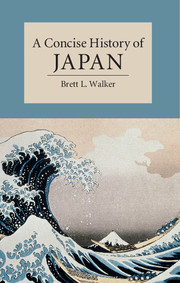Book contents
- Frontmatter
- Dedication
- Contents
- List of Illustrations
- List of Maps
- Preface
- Chronology
- Introduction
- 1 The Birth of the Yamato State, 14,500 bce – 710 ce
- 2 The Courtly Age, 710–1185
- 3 The Rise of Samurai Rule, 1185–1336
- 4 Medieval Japan and the Warring States Period, 1336–1573
- 5 Japan’s Encounter with Europe, 1543–1640
- 6 Unifying the Realm, 1560–1603
- 7 Early Modern Japan, 1600–1800
- 8 The Rise of Imperial Nationalism, 1770–1854
- 9 Meiji Enlightenment, 1868–1912
- 10 Meiji’s Discontents, 1868–1920
- 11 The Birth of Japan’s Imperial State, 1800–1910
- 12 Empire and Imperial Democracy, 1905–1931
- 13 The Pacific War, 1931–1945
- 14 Japan’s Post-War History, 1945–Present
- 15 Natural Disasters and the Edge of History
- Glossary
- Further Reading
- Index
12 - Empire and Imperial Democracy, 1905–1931
Published online by Cambridge University Press: 05 March 2015
- Frontmatter
- Dedication
- Contents
- List of Illustrations
- List of Maps
- Preface
- Chronology
- Introduction
- 1 The Birth of the Yamato State, 14,500 bce – 710 ce
- 2 The Courtly Age, 710–1185
- 3 The Rise of Samurai Rule, 1185–1336
- 4 Medieval Japan and the Warring States Period, 1336–1573
- 5 Japan’s Encounter with Europe, 1543–1640
- 6 Unifying the Realm, 1560–1603
- 7 Early Modern Japan, 1600–1800
- 8 The Rise of Imperial Nationalism, 1770–1854
- 9 Meiji Enlightenment, 1868–1912
- 10 Meiji’s Discontents, 1868–1920
- 11 The Birth of Japan’s Imperial State, 1800–1910
- 12 Empire and Imperial Democracy, 1905–1931
- 13 The Pacific War, 1931–1945
- 14 Japan’s Post-War History, 1945–Present
- 15 Natural Disasters and the Edge of History
- Glossary
- Further Reading
- Index
Summary
In the first half of the twentieth century, empire stood squarely at the centre of Japanese life: competition with European and US powers in the Asia-Pacific region, the need for natural resources, working distant fishing grounds to regenerate revenue and feed hungry mouths, and other forces all drove empire building. In the end, however, Japan’s ‘China policy’ served as the spark in the dry tinderbox that eventually led to the Pacific War. Japan’s ‘special interests’ in China challenged US and European access to Chinese manufactures and markets, and placed Japan on a collision course with the Great Powers. Japan’s foreign policy was designed to protect its economic and military investments in China, the most important of which revolved around the South Manchurian Railroad, leased to Japan after the Russo-Japanese War (1905).
But other subsurface forces propelled Japan towards ‘total war’ in Asia. In the US, a half-century’s worth of racially charged immigration legislation and antagonistic foreign policy disillusioned many Japanese diplomats and policy-makers who set an increasingly autarkic course towards empire. After the dual victories of the Sino-Japanese (1895) and Russo-Japanese (1905) wars, the Great Powers conspired to deprive Japan of its war spoils, chiefly territory in northern Korea and China. Clearly, no place setting remained at the table of the Great Powers for the up-and-coming Asian nation. In this context, Japan increasingly pursued an alternative form of modern nationhood, one that wove the legitimacy of an empire in East Asia from the threads of modernization and ‘pan-Asianism’. Rhetorically, Japan sought to defend its Asian brothers and sisters from Western imperial aggression and encroachment. It is no secret that race served as a powerful driver in the events leading up to the Pacific War.
- Type
- Chapter
- Information
- A Concise History of Japan , pp. 218 - 239Publisher: Cambridge University PressPrint publication year: 2015



